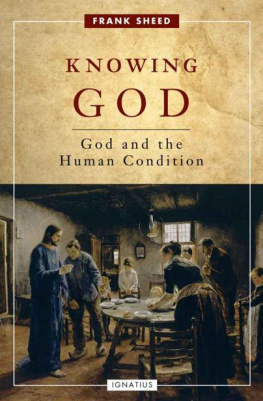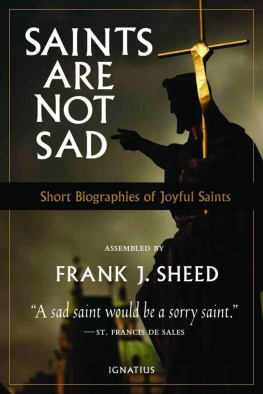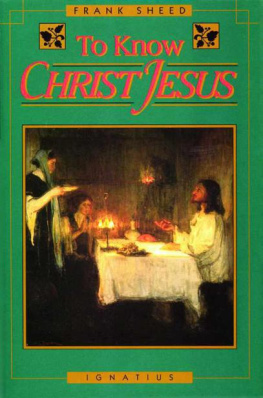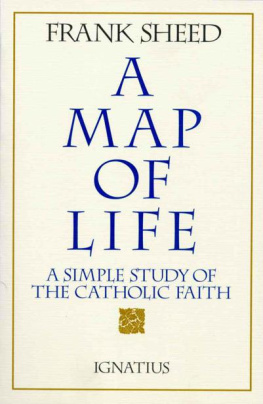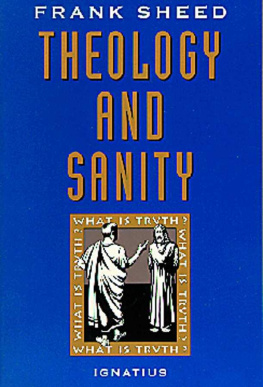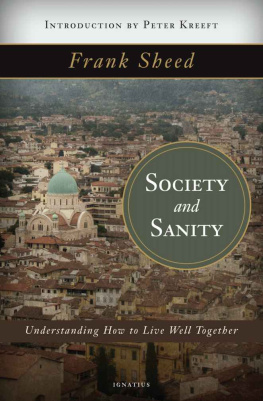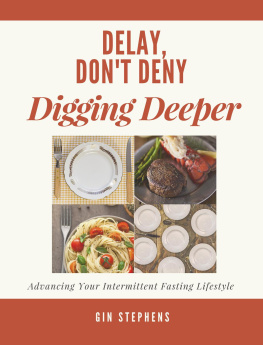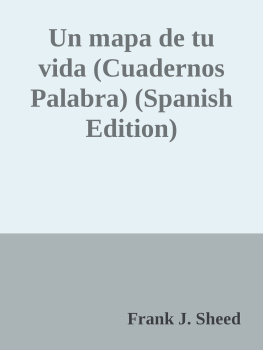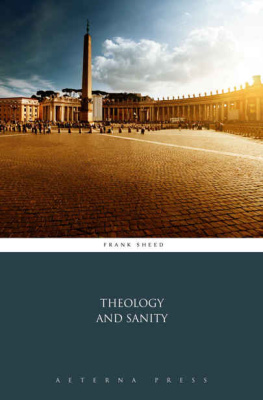Knowing God
F.J. SHEED
Knowing God
God and the Human Mind
IGNATIUS PRESS SAN FRANCISCO
Original edition
God and the Human Condition
1966 by Sheed and Ward, Inc., New York, N.Y.
Nihil obstat:
Thomas J. Beary
Censor Librorum
Imprimatur:
+ Robert F. Joyce
Bishop of Burlington
May 23, 1966
The Nihil Obstat and Imprimatur are official declarations that a book or pamphlet is considered to be free of doctrinal or moral error. No implication is therein contained that those who have granted the Nihil Obstat and Imprimatur agree with the contents, opinions or statements expressed.
Cover art: The Table Prayer , Fritz von Uhde, 1885
Nationalgalerie, Staatliche Muscen, Berlin, Germany
Photo Credit: Jrg P. Anders, bpk, Berlin / Art Resource, N.Y.
Cover design by John Herreid
Published 2012 by Ignatius Press, San Francisco
By arrangement with
The Continuum International Publishing Group, London
All rights reserved
ISBN 978-1-58617-665-5
Library of Congress Control Number 2012936993
Printed in the United States of America
Contents
1. Mental Equivalents
2. Vital Equivalents
3. The Necessity of Faith
1. Difficulties for the Finite Mind
2. Special Difficulties for Today
3. The Mysteries as Necessaries of Life
4. Sanity and Society
1. Spirit in the Old Testament
2. What Spirit Can Do
3. What Spirit Is
4. Spirit in the New Testament
5. Making the Concept Our Own
1. Doctrine and Impact
2. The Relation between Scripture and the Teaching Church
3. Why We Accept Scripture
4. The Word in His Church and the Word in Scripture
1. Inspiration Defined
2. Inspiration Existentially Various
3. The Problem of Inerrancy
4. When the Writer Writes More Than He Knows
5. Special Problems of Old Testament Inspiration
1. Guidance in Reading Scripture We Must Have
2. Doctrine and Scripture Not Simply Different Arrangements of the Same Material
3. The Unfolding of Revelation
4. The Two Testaments Need Each Other but Not Equally
5. Reading Scripture for Vital Equivalents
1. The Basic Mystical Experience
2. Indian Mysticism
3. Dionysius the Areopagite
4. Christian Mysticism
1. Thou Shalt Love the Lord Thy God
2. Yahweh
3. Religion before the Exile
4. Monotheism in Possession
5. The New Testament Shows Us the Same God
6. No Adequate Philosophy
1. Revelation and the Philosophers
2. How Can the Finite Know the Infinite ?
3. God Is Not Infinite Indifference
1. No One Knows.. .
2. The Innermost Life of God
3. Love Seeks Understanding
4. Not for Desiccation
1. The Word Who Is Son
2. The Holy Spirit
3. One God
1. Two Persons
2. Three Persons
1. The Mind We Bring to Scripture
2. Problems of Terminology
3. A Very Different Reading
4. Reconstructing the Original Revelation
1. Mental Equivalents
2. Vital Equivalents
I had planned to put what I have to say of God and man into one volume, under the title God and the Human Condition . It has seemed to be better to bring out two volumes with that as overall title. The present volume is God and the Human Mind . The second will be God and the Human Race .
The whole represents my attempt at aggiornamentowhich does not mean presenting as much of the Churchs teachings as men today can accept. It means (1) presenting it as it now is , at the point of itsand our ownpresent development; (2) stating it with such an understanding of todays difficulties, todays ways of thinking, speaking, asking, that todays man may know what we are saying, and may see what the same truths might mean for him too.
My concern in this first volume is with what the human mind can know of Godwith Gods revelation of himself; with theology, which is revelation explored by men with Gods aid; with how each can make all this his own, not verbally only, not even mentally only, but vitally.
Not verbally only, I say. But words are a large part of the matter. We must examine them closely; it is not sufficient to use them as consecrated formulas. They are telling us something about God; we must find out what it is. We must see why we use one set of words, avoid another, reject another. We must draw light from them to the limit of our present knowledge, without envy of our children to whom they may yield more light.
The aim of the present study is practical and at three depths. For the intelligent living of life nothing can be more practical than to know how we (or anything) came to be here, and where we are supposed to be goingonly God can tell us.
There is a second depth of practicality: what we learn of God can nourish, develop, vitalize the selves which have to live the life.
And a third: God is not a problem to be solved, not even a solution to be admired, but a reality to be possessed, contemplated, conversed with, loved, enjoyedthis is fullness of living.
With God one and three, with creation, Incarnation, Redemption, with every matter treated in either volume, the effort will be made to see how life is richer for our knowing it. The reader new to this kind of thinking will find it helpful at every point to pose himself the question: What difference does the doctrine make to me? If it had never been revealed, would I have lost anything? To this last question he should constantly return.
At the moment Christians find themselves in what looks to them like a crisis of theology. They get the feeling that age-old certainties are being called into question and that it might be wiser to leave theology alone until the storm has blown over. Storm there is, but running for cover is not a good way to live through it, and no way at all to grow surer and stronger in it.
The air is filled with such a swirl of questionings as we have never known at one time, but there are levels of seriousness, largely because anybody feels that he can say his say. There is some pretty wild talk. But even at saner levels, I seem to be coming all the time upon new questions which in fact I had been hearing, new doctrinal ideas which in fact I had been teaching, these past forty years. Some of our more revolutionary thinkers seem to me to have led pretty sheltered lives.
None of this applies to the Rahners, the Schillebeeckxes, the Durrwells, the Benoits. For there are serious developments under discussion, their possibility rooted in the very nature of human utterance. No statement either as given in revelation, or as developed by the Churchs living with it and by it, can be more than a beginning. Even if finite words could contain the infinite, finite minds could not extract the infinite from them. But the great definitions proclaimed by the Church as contained in revelation or issuing from it are light-bearing; possessing them, we are in the light. In that light we can grow, not by extinguishing and substituting, but by growing in capacity to receive and respond.
God who gave the light has continued to guard mens growth in it. There are moments when the sense of God looms so immense that the phrases of revelation and doctrine seem to mock us with their shallowness; they are shallower than God certainly, but they are not shallower than we, and by them we can move out of our shallows. We shall move deeper all the more surely by knowing the depth at which we now stand. Organizing, surveying, living fully in the territory already won is the best preliminary for conquering new areas for light.
For growth in the light everything servesScripture of course, but philosophy and mysticism too, and all the ways by which men advance in knowledge of the created universe. No one mind could cope with all of these; all do not serve equally, all have something to give. But Scripture, above all.

